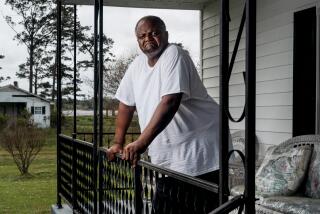Four-Hour ‘Common Ground’ Recalls Boston’s Days of Rage
- Share via
Boston burning.
What a curiously satisfying/unsatisfying work of split personality is “Common Ground,” the two-part drama airing at 9 p.m. Sunday and Tuesday on CBS (Channels 2 and 8).
On the one hand, these are four hours of angry, seething television that convey rage so powerfully and convincingly that you feel it to your toes. You recall these days and recoil, for the court-mandated desegregation of Boston schools through forced busing exploded into a brutal conflict that reverberated across America, trailing a residue of suspicion and bitterness.
The great strength of Edward Hume’s script is its ability to treat both sides in this conflict fairly and empathetically without condoning mutual hatred and bigotry, or the anti-black taunts and violence by some of the multitudes of frustrated working-class whites who fought forced busing.
On the other hand, this TV treatment of recent American history--based on J. Anthony Lukas’ Pulitzer Prize-winning book “Common Ground: A Turbulent Decade in the Lives of Three American Families”--has no single defining vision. Yes, racial and economic oppression are evil. When the credits roll after a disappointingly ambivalent ending, however, you’re left with questions:
What did Boston’s forced busing achieve? And whatever that achievement, was it worth the cost? Was it worth the anguish suffered by the three real-life families--one black and two white--whose experiences are depicted here?
Beautifully directed by Michael Newell and featuring one superior performance after another, “Common Ground” opens in 1968, when the assassination of the Rev. Martin Luther King Jr. exacerbates Boston’s racial tensions and sparks outbreaks of looting and violence by blacks.
The next seven years are refracted through the lives of the three families:
--Colin and Joan Diver are a liberal young white couple who move into Boston’s racially mixed South End to participate in the neighborhood’s expected economic rejuvenation. Colin (Richard Thomas) is a Harvard Law School graduate who works for Mayor Kevin White.
--Rachel Twymon (C.C.H. Pounder) and her six children are blacks living in the predominantly black neighborhood of Roxbury.
--The McGoffs are Irish Catholics living in Boston’s Charlestown area. When her husband dies, Alice McGoff (Jane Curtin) has to support her seven children alone.
The title “Common Ground” has virtually nothing to do here with a meeting of minds and everything to do with clashing sides perilously coexisting inside the same school. The Twymons and McGoffs, in particular, occupy opposite poles on the busing issue, with the Twymon children reluctantly getting bused to white schools as part of the city’s integration plan, and the McGoffs actively opposing busing--with some of them initially becoming a party to violence.
Never has the word nigger been used as often on TV as in “Common Ground,” which admirably presents the issues and ugliness associated with Boston’s mandatory busing with rare candor and ferocity. Cassandra Twymon (Erika Alexander) and other black students arriving at previously all-white Charlestown High School are met by white “townies” chanting “go home,” and blacks are later attacked. Inside and out, the school becomes a war zone, a mini-Beirut where fear, hatred and ignorance eclipse education.
“The issue here isn’t the separation of blacks and whites, it’s the separation of rich and poor,” says the pragmatic Mayor White (James Farentino). That may characterize this case as it was actually played out, but it’s not supported by “Common Ground,” whose steady undertone of racism--whatever its motivation--is its loudest, shrillest sound.
The combative school sequences are mounted so realistically by Newell that the hate-twisted white faces and other ugly images are burned into your mind. As are the performances, all of which ring true. However, it’s Pounder and Alexander who are exceptional--both their work separately and together as a mother and daughter in conflict, lifting television to a rarefied higher level.
But whose voice is “Common Ground”? Confusingly and awkwardly, Cassandra is sometimes the story’s narrator, even though her point of view is only one of several expressed by the story. Meanwhile, the Divers are clearly one family too many in this dramatic equation, evidenced by their frequent long absences from the story, as if Hume had no convenient spot to fit them in.
With time, fissures appear in Charlestown’s wall of bigotry, and uneasy peace prevails. But for how long? And to what end? After having so much to say for so long, “Common Ground” now falls silent.
More to Read
The complete guide to home viewing
Get Screen Gab for everything about the TV shows and streaming movies everyone’s talking about.
You may occasionally receive promotional content from the Los Angeles Times.






